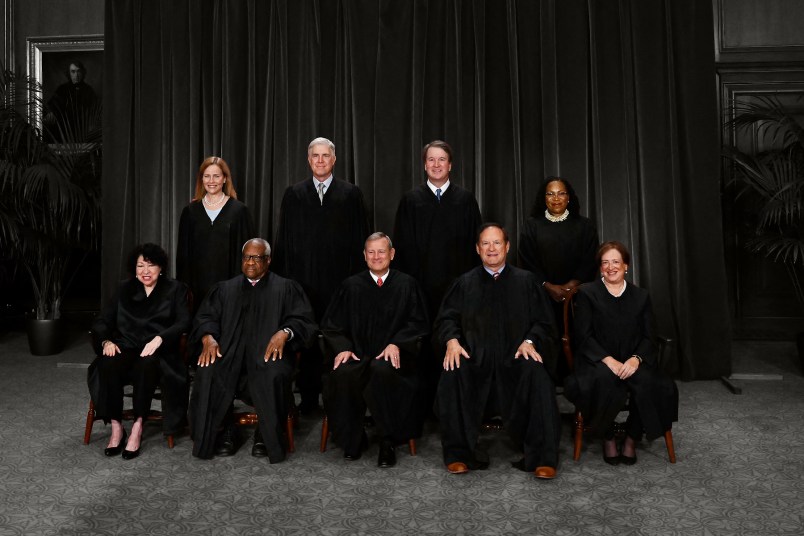Increasingly over recent months and years I and many others have been arguing that the current Supreme Court is fundamentally corrupt. The venal corruption we’ve seen on display with Justices Thomas and Alito is part of that but far from the most important part. The right-wing conservative majority is both the product of and the embodiment of a deeper corruption: put simply, an organized and successful attempt to pack the Court and, with this power achieved, dispense with any pretense of a consistent theory of jurisprudence to advance far-right and partisan Republican claims and thwart democratic action. And yet just as we’re making the argument we’ve seen a string of decisions in which to varying levels of surprise the Court has turned back novel right-wing power grabs and efforts to advance Republican interests under the cover of law.
So what’s up here? Did we have something wrong?
It won’t surprise you that I don’t think we got anything wrong. But the contrast or disjuncture is great enough that it deserves some explanation. And since I’ve been such a critic I wanted to offer one.
First, we should note that the term isn’t over. Major decisions on affirmative action and student debt, among others, are still to come. So it’s premature to evaluate the term before it’s complete.
But what’s happening? Big picture, I think the events of the last two years especially have given two or three justices pause that the extremity of their behavior has gone far enough and produced a big enough backlash that it seriously endangers their ongoing power. John Roberts has always been somewhat in this camp. In the nature of things, the argument may have more sway with Justices Kavanaugh and Barrett, who likely see themselves being on the Court for 20 or 30 years, or more. It is impossible to know this with certainty of course. They’re not going to tell us. And while some indications may come out years later in personal papers, they may not be fully candid with themselves. But I think that’s a driving factor.
Devotees of Supreme Court history will know there’s a historical analog to this in which observers got it wrong. It was long believed that while Franklin Roosevelt’s court-packing plan failed, it nonetheless cowed the justices into adopting a more flexible approach to state regulation of commercial activity. The Court’s shift was the “switch in time that saved nine.” But later access to the memorandum and papers of different justices showed this wasn’t true. That the key change actually preceded Roosevelt’s announcement.
In other words, you can’t know for certain. But that’s my strong assumption.
There are two further points worth making.
We should keep in mind just how off the deep end many of these cases really were. The “independent state legislature” theory or doctrine is one that has a vague grammatical plausibility, has no support in history whatsoever and is absurd in its effect. It’s worth noting that every state constitution written since 1787 was written by people who stunningly enough had no idea this is what the constitution meant. The fact that this idea even got a hearing, let alone that three justices supported it, shows just how off the deep end this Court really is.
And here’s where I think we get to a tighter aperture on what’s going on with the Court. I’ve argued that at some level they’re now cowed by the public backlash against the Court’s general corruption and especially its Dobbs decision. We can get more specific. And this is why I think the upcoming affirmative action decision won’t have any surprises. There are certain core issues Federalist Society judges really care about. Abortion was likely at the top of the list. Affirmative action is another big one. More generally, dramatically reining in the federal government’s ability to regulate economic life is super high on the list. But in recent years we’ve seen the Court giving a hearing to and often affirming whatever novel doctrine right-wing ideologues, or the contingent electoral needs of the Republican Party, produce.
My question is whether what we’re going to see is the Court pulling back from what whackier and more transparently partisan stuff and just focusing on the core Federalist Society wish list.






